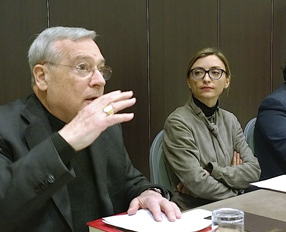Last February 26th, the FPSC (CEMOFPSC)’s Middle East Studies Centre organised the meeting “Dialogue and freedom of religion, fifty years after Nostra Aetate”. The speakers were Mons. Agostino Marchetto, Secretary of the Pontifical Council for the Pastoral Care of Migrants and Itinerant Peoples; and Mustafa Cenap Aydin, Director of the Tevere Institute.
Among the statements of Mons. Marchetto, standed out that with the Second Vatican Council, the church recognises the right every human has of religious freedom. This makes the difference with the past: it is not the Truth the one with rights but humans; that’s why his right and responsibility is to look for the Truth.
He also admitted the Second Vatican Council, with “Nostra Aetate y Dignitatis Humanae”, has generated new ideas, efforts and initiatives; but its implementation needs time and effort.
To protect minorities, he thinks a greater secularisation would help, but also Muslims adopting declarations and positions against fundamentalism.
Aydi, stated “Notra Aetate” is a relevant document for reconciliation: Christians and Muslims must work together and properly communicate for the sake of all men.
He also highlighted the fact in Koran there is no religious coercion. Fundamentalism is a reality external to the nature of religion. ISIS is not Islam, as the last one doesn’t impose a form of State.
He also talked about the fact that Islam is not protected in Europe. Mosques are built in places such as garages and basements; being possible for everybody to self-declare Imam, what is not possible in Muslim countries.
At last, he reminded terrorism does mainly affect Muslims: despite in Europe it is rightly talked about the prosecution to Christians, ISIS claims more victims among Muslims.





